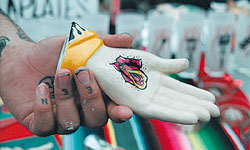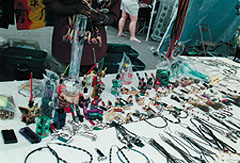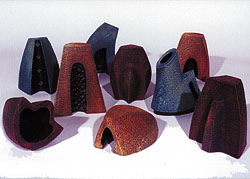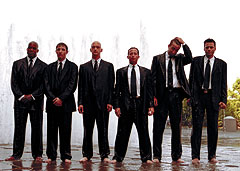The party was well under way by 3:30 p.m., and the streets were well littered with a myriad of rubbish: smashed beer cans, yellow cigarette butts and flattened cardboard drink cups. People wearing cut-offs and T-shirts were hanging out on their porches in the overcast afternoon, drinking beer, smoking and enjoying the free music.
It seems the whole community was out in support of the event, including the Grace Temple, which set up a barbecue pit in its parking lot to sell hot dogs, chips and water to the passing freaks and other assorted people. Little kids on Rollerblades, obese men covered in tattoos and hippie-chicks with flower wreaths in their hair - Fry Street was a chaotic melting pot for anyone and everyone with only one thing in common: the desire to have a good time listening to music and drinking beer on a Saturday afternoon. At the entrance to the fair, there were long lines of blue portable toilets and an even longer line of freaks with full bladders waiting their turns. One man was in the stall with the door unlocked, while his longhaired friend, sporting a white cottonmouth T-shirt with a huge pot leaf on the back, kept opening the door on him, exposing him before his peers. He didn't seem to mind, however, as he continued on with his business, unmindful of the line of people he was flashing. The people in line weren't bothered either; they'd probably see worse before the night was over. Across the street from the entrance was an entourage of 18-wheeler beer trucks, Budweiser "The King of Beers," Coors and Miller Lite. People were juggling on the lawn, while vegetarian stands and wheat-grass vendors sold their sweet, green elixir for "a good price." The entrance was set apart by a chain-link fence with spray-painted newspaper flowers stuck in the holes and cops strategically placed at gaps to prevent people from bypassing the $15 admittance fee. A large, black trash can served as a barf bag for a young girl with long, brown hair, which was being held back by another young girl in cut-offs and a black tank top. The cops standing 3 feet from this spectacle just looked the other way.
A festival of many faces Practically everybody had braids in their hair - men and women alike. The entire tie-dye and hemp industries had come out to set up their kiosks and peddle their THC-free, color-streaked wares. The most beautiful thing about Fry Street was the diversity of the participants. One may see people of all colors, races, religions, creeds and lifestyles; at the fair, anything goes. One can see pale, black-maned Marilyn Manson look-alikes jamming alongside robed Hare Krishnas and tripped-out ravers in baggy Jncos and "Mary Jane - no pain, no Jane" T-shirts. There were young couples with rosy-cheeked children riding on their fathers' shoulders and lesbian lovers holding hands. There were longhaired hippies with plastic pot leaf wreaths around their necks, selling beautifully colored blown-glass pipes right in front of cops. The air was filled with the pungent, cloying scents of Nag Champa incense, pot and clove cigarette smoke, grilled meats and spilled beer. Noteworthy tunes The event, sponsored by the Delta Lodge, featured several bands on three stages. They all sounded similar, though their appearance and names were different.
The vibes in both these areas were kind of dark and foreboding. Perhaps thrash-metal would be the best way to describe it, but others referred to it as "generic '90s punk rock that wants to be '70s." One observer commented, "Every time we come over to the main stage, all it is is some unintelligible death-rock type of music." Surprisingly, no mosh pits could be detected. The only obvious violence was at the gladiator joust booth by the Red Bull stand. Just when Bowling for Soup began sounding kind of cool on the main stage, they went into a vibe-killing rendition of Bon Jovi's "You Give Love a Bad Name." The black Eagle (KEGL) van was at the main stage where its representatives were handing out goodies in plastic bags declaring "97.1 The Eagle Rocks!" Surprisingly, the most unique music was happening on the outskirts of the main venues. At the entrance, a lovely swinging gig called the Dan Schwindt Quartet featured some funky guitar riffs and even a longhaired guy blowing saxophone. It was tempting to stay outside of the event with all its screaming sinister sounds and just groove along with this little-known band, enjoying its good-vibration jam session. Besides, it was free.
Sound and light waves mix By far, the best vibes and music were at the deejay booth on the west side of the main stage in the street by the Delta Lodge. As the crowd gathered, DJ Spencer Wade began spinning some truly phat, funkadelic tracks. At first, only a couple of people were dancing; then everyone in the vicinity joined in and grooved to the jamming and flowing, hard-hitting beats. People were smiling and laughing, slapping high fives and handing out flier party invitations and tapes. It was at this point in the event, about 7:30 p.m., that the sun finally began to filter through the gray sky to shine upon the crowd dancing in the garbage-filled street in front of the deejay booth. It was as if it had waited for that precise moment to come out of hiding and share its warming glow.
Tasting the fair So many different types of food and drink were for sale, it was difficult to choose what to sample. There was cheesy pizza, greasy burgers, spicy sausage-on-a-stick, and of course, those American filler-full treats that people seem to love despite the risk to their health: hot dogs. The most unique food by far was fried salt (not for the weak-hearted, mind you), which consisted of "salt from the desert," or so the vendor said despite the boxes of Morton's kosher salt placed nonchalantly around the kiosk. The salt is dipped in batter and deep-fried and served in a paper cup with ranch dressing drizzled on top. "It's fried, and it's salty," said Kim Kirkpatrick, a Texas-born Colorado Springs, Colo., resident and ex-TCU student. Beers such as Shiner Bock and Heineken were $3 a pop.
Fair fries up a good time Though the music is an integral part of the Fry Street Fair, the atmosphere has almost as much to do with why people come. "It's good music, it's a lot of fun, it's a lot of drinkin' and it's just a good time," said Curt Fleissaer, a former UNT student. "It's a place you can go where you can be yourself; you can have a good time, and there's no problem." For some it is a tradition that will never die; they will travel great lengths to experience the Fry Street Fair. "All these Texas freaks - I love it," said Kirkpatrick as the bands packed up, and the crowd headed into the night past the Grace Temple parking lot, with the members still peddling their hot dogs, chips and water, their signs proclaiming "good food - God bless!"
Carey Hix
By Omar Villafranca staff reporter Julia Franklin, a student artist, can tell part of a person's personality just by looking at the heel of his or her shoe.
"I think the shoe is an exciting idea," Franklin said. "I broke down the shoe. When someone wears a shoe, it molds to their foot. It then becomes part of their personality." Franklin says the wood and ceramic sculpture exhibit allowed her original source to reveal her identity. Franklin said it also allowed the source to address personal issues of conformity, containment and healing. "Women will understand some of the works," Franklin said. "Women have to contort to wear shoes. Some of the works are serious and comical." Franklin graduated from Midwestern State University, in Wichita Falls, Texas, with a bachelor of fine arts degree in 1997. The Wichita Falls native has had her work displayed in 30 international, national and regional competitive exhibitions. Some of her work is currently on display at the City Museum in St. Louis and at Sul Ross State University in a display of emerging women artists. After the work leaves TCU, Franklin said half will move to an exhibit at the University of Houston. The exhibit in Houston is in conjunction with the International Sculpture Conference in June. The plans for the other half of the display have already been finalized. "I've already sold the other half of the exhibit," Franklin said. "The little pieces go quickly because they are really colorful. I'm glad people have taken my art with them." The exhibit is free of charge. The gallery is open from 11 a.m. to 4 p.m. today through Friday. For more information on the exhibit, call 257-7643.
Omar Villafranca
By Justin Roche Skiff staff Somewhere out of the darkness, an audience member shouts out a suggestion for a scene, and David Wilk has but seconds to grab props, change costumes and present a random sketch to more than 200 people waiting to be amused and amazed.
The audience is surprised and delighted, and because of the nature of improvisation, so is Wilk. "I don't know anything more than the audience does when the lights go up," the 33-year-old performer said, grinning at the thought of his trade. "That's what I love about improvisation; it's limitless. It can go anywhere." But Wilk had no idea it could go this far. Only three years after he, Troy Grant and Frank Ford brought improv comedy to Fort Worth with "Four Day Weekend," Wilk and his cohorts have risen to the level of comedic icons. Their shows sell out every weekend, giving them the distinct honor of being the longest-running show in Fort Worth. Their fans are loyal, coming to repeat performances week after week because, Wilk said, "It's a completely new show every time." Rave reviews, supportive audiences, growing recognition - all this success from a show that was only scheduled for a six-week run.
Defining moments of improv This unforeseeable good fortune is indicative of the nature of Wilk's profession. Improvisational comedy involves making up humorous scenes on the spot from a random suggestion. No planning, no scripts, no clue. Just a quick, creative mind and recognizing what improv is not. "It's not how fast you can think or what funny things you can say; that's not it at all," Wilk said with a seriousness that contrasted his usual upbeat tone. "It's not telling the audience a joke but taking them on a journey and letting them discover the humor." The suggestions that fuel the scenes need not be funny or outlandish, Wilk said. He said he would rather be challenged to work with an everyday word instead of "Midget Jell-O wrestling," that many first-time audience members like to throw out. "It's great when we get a suggestion like 'Apple,' and we end up in a scenario where a father and son haven't spoken in years, and something amazing happens between the people, not apple. The humor is going to come from what relationships I can create and explore with my fellow improvisers. That's the trick to improv: listening and building."
The road to center stage Being funny is something that has always come naturally to the charismatic man who is short in stature but loaded with personality. Wilk said he was the typical class clown, getting laughs from his fellow students while being berated by his teachers. "I remember a teacher asking me, 'Do you want to be a fool all your life?' And I remember thinking, 'I wonder what that pays?'" Wilk said he didn't realize college wasn't for him until he enrolled at the University of Arkansas. Not feeling as if he was learning anything, Wilk took a summer job on a cruise line "just to get away." His summer stint turned into three years as he worked his way up to cruise director. "I was 22 years old, and I kind of felt like an entertainer," he said. "I had a microphone, I was making people laugh and I thought, 'This is great!'" His taste for performing led Wilk to Phoenix to do some stand-up comedy, a period of his life he described as, "A lot of hard work and a lot of bad comedy." A prompting from his then-girlfriend, now-wife, Amy, took him to Dallas, where he stumbled upon the facet of comedy that would become his forte: improvisation. Going to an audition for a troupe he had never seen or heard of, Wilk began his improvisation career and met his future business partners and best friends Grant and Ford, who were also improvising with troupes in Dallas. But it wasn't until Ford took a trip to Chicago to see "The Second City," the Mecca of improv comedy for 40 years, that the trio's eyes were opened as to what improv could really be. "Frank came back with this glow about him and said, 'We've been doing it all wrong,'" Wilk said, recalling the turning point in his career. "Troy went, and then I went up, and it completely changed our lives, as far as being performers and what improvisation was. "We knew how to get laughs, but it turned out we didn't know one thing about improvising." This revelation led Wilk to commute weekly to Chicago and study with "The Second City," where he said he learned how improv works and what it's all about.
Making the mooo-ve to Cowtown With this new insight, Wilk, Grant and Ford decided to form their own improv troupe, although they scoffed at Grant's suggestion of performing in Fort Worth, known more for its cows than its comedy. "We laughed until we came down to Sundance Square on a Wednesday night around 11:00, and it was jumping," Wilk said. "And we said, 'Yeah, we're going to come here.'" The beginning was rocky for the unknown show. Little publicity and a town that had little to no exposure to improv comedy made "Four Day Weekend" seem like an extended leave of absence. After their first six weeks, their show was extended indefinitely by Mike Hendrix, the owner of Casa on the Square, where the trio had been performing. But the next three or four months would bring more struggles than audience members. "We would be playing in front of 15 to 20 people," Wilk said, still with a tone of frustration. "I would get here at 4 in the afternoon and stand and hand fliers out until five minutes to 11, run up, change clothes and perform to the seven or eight people I had convinced to come to the show." But word-of-mouth and a feature story by the Fort Worth Star-Telegram brought "Four Day Weekend" into the community consciousness and brought Wilk and his partners a packed house almost every weekend.
Quitting his day job Along with the success of "Four Day Weekend," Wilk has appeared in more than two dozen commercials and even had a role in the 1998 film "It's in the Water." And with his performing duties with the improv troupe, Wilk also runs the business aspect and said getting paid for what you love to do is incredible. Wilk said he did try a "normal" job once, working a desk job at National Flood Information Services for three months, something he absolutely hated. "It was the worst three months of my life," he said, with a sigh that comes out heavy even after many years. "One day I just got up from my desk and started walking toward the door. Some guy asked me 'Dave, can you...,' and I said, 'Man, you've got me confused with a guy who used to work here.' And I left. I just can't do that." Considering the way things are going in Wilk's life, he won't have to do anything like that again. Flashing the sly grin that has caused many audience members to form the same gesture on their faces, Wilk said he's proud of what the unexpected world of improv has brought him and his partners. "I feel we've really educated the Fort Worth area about improv," he said. "I want these people to have a good time. If they choose to come here, then I want them to enjoy it." Apparently 212 people enjoy it every Friday and Saturday, as the capacity for the theater is constantly sold out. And although many come repeatedly, they never see the same show twice. On this night, Wilk and his troupe have converted suggestions like "Spider Man," "Asparagus" and "Hairspray" into musical numbers, a sketch about a dysfunctional family and other scenes that are just as much a surprise and delight to Wilk as they are to the crowd. Laughter saturates the theater, tears stream down the faces of some patrons, and in front of them, dressed as a cowboy, nerd or whatever he can transform into in a matter of seconds, is the smiling performer who hasn't a clue as to what's going to happen. But it sure beats a desk job. Justin Roche |
| The TCU Daily Skiff © 1998, 1999 Credits |
 The free music is one of the benefits (or
disadvantages, depending on your opinion of the event) of living on the
streets near the intersection of Fry Street and Avenue A, the vortex of
alternative music and lifestyles, at least during the 21st annual Fry Street
Fair in Denton.
The free music is one of the benefits (or
disadvantages, depending on your opinion of the event) of living on the
streets near the intersection of Fry Street and Avenue A, the vortex of
alternative music and lifestyles, at least during the 21st annual Fry Street
Fair in Denton. After 3:30 p.m., the songs by all the bands on the main
and Delta stages, with possibly the exception of Adventures of Jet, which
was described as "loud and poppy" by a fellow participant, shared
the same features: driving guitar riffs, raging bass-lines, booming drums
and unintelligible lyrics.
After 3:30 p.m., the songs by all the bands on the main
and Delta stages, with possibly the exception of Adventures of Jet, which
was described as "loud and poppy" by a fellow participant, shared
the same features: driving guitar riffs, raging bass-lines, booming drums
and unintelligible lyrics. Franklin, a candidate for a master of fine
arts degree at TCU, is exhibiting a body of work titled "Revealing
the Heel" as part of her degree requirement. The exhibit came from
a four-year study of shoes which explores the importance of the heel. The
exhibit runs through Friday in the Moudy Building North, Room 141.
Franklin, a candidate for a master of fine
arts degree at TCU, is exhibiting a body of work titled "Revealing
the Heel" as part of her degree requirement. The exhibit came from
a four-year study of shoes which explores the importance of the heel. The
exhibit runs through Friday in the Moudy Building North, Room 141. As Wilk and the other five members of the
improvisation comedy troupe "Four Day Weekend" take the challenge,
the simple proposal transforms from an obscure spoken word into a unique
scene in which anything can happen, but the result is always the same:
roaring laughter and applause from the crowd.
As Wilk and the other five members of the
improvisation comedy troupe "Four Day Weekend" take the challenge,
the simple proposal transforms from an obscure spoken word into a unique
scene in which anything can happen, but the result is always the same:
roaring laughter and applause from the crowd.